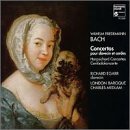| All Artists: Wilhelm Friedemann Bach, Charles Medlam, London Baroque, Richard Egarr Title: WF Bach: Concertos for Harpsichord & Strings Members Wishing: 0 Total Copies: 0 Label: Harmonia Mundi Fr. Release Date: 9/19/1995 Genre: Classical Styles: Forms & Genres, Concertos, Historical Periods, Baroque (c.1600-1750), Instruments, Keyboard Number of Discs: 1 SwapaCD Credits: 1 UPC: 794881328321 |
Search - Wilhelm Friedemann Bach, Charles Medlam, London Baroque :: WF Bach: Concertos for Harpsichord & Strings
 | Wilhelm Friedemann Bach, Charles Medlam, London Baroque WF Bach: Concertos for Harpsichord & Strings Genre: Classical
|
Larger Image |
CD Details |
CD ReviewsAnother Bach Emerges albert b. kelley | ojai, ca United States | 07/02/2000 (4 out of 5 stars) "In the world of classical-music recordings, the works of J.S. Bach naturally have overshadowed those of the "other" Bachs - the great composer's sons and ancestors. Yet as this CD demonstrates, there is considerable, beauty, originality and power in those too-neglected works. Charles Medlam, the well established interpreter of Baroque music, and his London Baroque ensemble are joined here by harpsichordist Richard Egarr in a demonstration that J.S.'s son Wilhelm Friedemann was in his own right an exceptional composer with a firm understanding of both his father's Baroque-synthesizing insights into musical structure and the new demands of the emerging Classical period in composition. This generally well-produced recording of three clavier concertos by J.S.'s oldest son sparkles with a blend of the old and the new - hints, and sometimes strong ones, of his father's musical approaches combined with treatments evocative of Haydn and the younger Mozart (whom it is said was taught briefly by one or more of the Bach boys). The performance stands as worthy of listening in its own right. And for those as yet unfamiliar with the output of Bach's more talented offspring, W.F. and Carl Philipp Emanual, it is an excellent introduction to a too-often bypassed corner of musical satisfaction."
|

 Track Listings (9) - Disc #1
Track Listings (9) - Disc #1